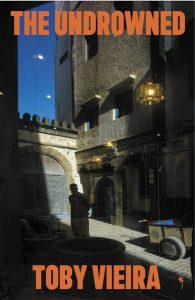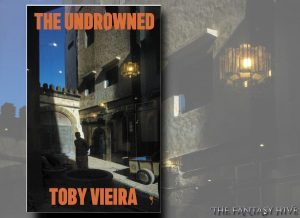THE UNDROWNED by Toby Vieira (BOOK REVIEW)
Toby Vieira was born in New Delhi. He bought a copy of The Waste Land at the age of 16 and has not been able to put it down since. He has lived and worked in the UK, Belgium, Germany and Singapore, and has settled, for now, on the shores of Lake Leman. He is the author of Marlow’s Landing (JM Originals), published to critical acclaim in 2016.
Publicist: @nateashleypublicity (instagram)
The Undrowned is a rare piece of writing. The narrative drips with speculative expectations and violence, whilst feeling derivative of plague stories or a cocktail of mistrusting authorities with a covid hangover. The story is lonely, making you feel large hollow voids inside yourself as you continue to read. Vieira is the master of “show don’t tell,” penning powerful emotions into the mundane, utilising the readers expectation of the speculative genre to string us along, until the disorientating nature of the novel leaves you feeling hopeless desperation for the protagonist, Sebastian.
“The clouds were heavy like fat balloons waiting for a puncture to drench the Portland stone.”
One could easily tag this novel as a ‘post-covid-paranoia-and-caffiene-fueled-nightmare-with-infected-monkey-covid-style-conspiracies-and-an-untrustworthy-government,’ but, I wouldn’t be so quick to jump to this conclusion. There’s too much ambiguous death for that to be true anyway.
“The place throbbed with life and light and I was there for a funeral without a body”
 This near-future speculative world is living in fear of a new illness, that appears terminal:
This near-future speculative world is living in fear of a new illness, that appears terminal:
“The yellow in the eyes came before the temperature went up, and the next thing you knew there was a chill rising up, and the next thing you knew there was a chill rising up through your legs, your knees were going wobbly, and then it started cooking your innards and then your brain and by the time you put two and two together it was too late anyway.”
The topography of every street, business, airport and anywhere else humans may congregate is layered with covid-aesthetic accessories; temperature checkers, masks, sanitizer, etc. Whilst the initial introduction to this world echoes of covid, it also reminded me of countless plague narratives, as I read, examples such as I am Legend (2007), Z Nation (2014), 28 Days Later (2002), The Rezort (2015) and Doomsday (2008) flashed into my mind, quickly convincing me that this was the direction the novel would take.
“My bones were burning, but I managed to get a flight out, and I had it all to myself.”
Sebestian, with his colleagues, has been sent to The Land Of to document the outbreak of the disease / civil unrest / the effects of war… etc. Calling this part of Africa ‘The Land Of’ reminds of common phrase constructions that refer to a state or condition (like, The Land of Nod being asleep), The Land Of seems to imply The Land Of: “death,” “war,” “disease,” “decay,” “unrest,”… The list could go on. The pages spent in The Land Of reads hopelessly, with people performing daily tasks in blissful denial, or scrambling around like rats trying to leave a sinking ship but having nowhere to go. The Land Of reeks of desperation and desolation, Vieira’s expert hand paints it as a polluted place, that’s only going to spread, the Slow Violence of the outbreak and war slowly tip toeing over borders, rivers and oceans to touch the entire world.
“The Land Of, maps of the outbreak spreading like an oil slick across borders and rivers and estuaries.”
Sebastian and his colleagues face challenges in The Land Of, and rapidly things go very wrong. Sebastian narrowly escapes with his life and only just managed to get home.
Similar to covid / long-covid, the disease seems to effect your sense of smell, and Sebestian, as the first person not to succumb to the disease, finds himself facing strange smells and bouts of anosmia. Leading to some pretty strange, but almost familiar instances of smelling things that aren’t there, or smelling death and burning when no one else can.
“I’d started smelling things, things that were probably not there. “oh really,” she said. “And how do you know they’re not there?” “Because no one else can smell them. Flowers, offal, burnt things” […] “It’s not just smells. It’s as if I can smell colours. Moods, even. Vibes, if you like.”
I keep mentioning Vieira’s writing, for me, it made the novel. I haven’t read anything so unusually constructed since Josephine Hart’s Sin. Vieira’s style is almost phantasmagorical, or written with such bludgeoning drama and pizzazz, it isn’t like anything I have read – I cherry picked some fantastic examples that don’t spoil anything, just to give a flavour of what is sprinkled throughout:
“My nostrils were flaring like a dog on a scent. Charcoal and dust. Burnt things and fevers. The smell of a body count, growing.”
“A boy with a thick crust of blood under his eyes walked next to me and he wasn’t looking at me because he wasn’t looking anymore.”
“I began to feel sick, as if someone was drawing a rough wooden spatula through the inside of my stomach.”
“The sleep I got was shot through with dreams like shrapnel.”
“The willows weren’t weeping. They were howling and raging with wild abandon against the fading of what little light there was, a little red light blinking to salute the end of days”
The bleak, but beautiful, use of language, perfectly frames the dismay and loneliness throughout the novel, forcing the reader to reflect not only on their own state of potential loneliness, but also the state of the world since the pandemic. Vieira has violence hiding behind every corner, including a mysterious war lord who may or may not exist, and may or may not have been targeting Sebastian and other journalists (we may never know). As well as literal violence, Vieira utilises concepts of Slow Violence (‘a violence that occurs gradually and out of sight, a violence of delayed destruction‘ – Rob Nixon) to show us snap shots of possible future issues, such as floods:
“Pumps belched down on the flooded embankment below Charing Cross station; a dredging barge was moored under the bright, the current pushing hard against its chains. The sky convulsed with thick black clouds looking to vomit their load.”
The Undrowned is a tale of abject loneliness, with the isolation of Atwood’s ‘Snowman’ from Oryx and Crake, the paranoia of Orwell’s Winston from 1984, and the uneasy feeling of ‘it’s coming’ without knowing what ‘it’ is that we have all experienced. Vieira’s novel is unusual, with a narrative that becomes almost intangible and amorphous by the end. Sebestian infects the novel with his loneliness, just don’t let him infect you.
The Undrowned is available now, you can order your copy from Bookshop.org

